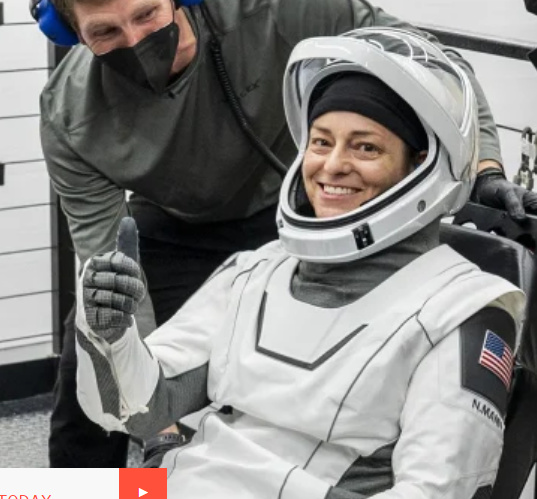
- Details
- By Native News Online Staff
Breaking News. The SpaceX Dragon spacecraft carrying Nicole Aunapu Mann, the first Native American woman in space, and fellow space explorers from the U.S., Japan and Russia splashed down at approximately 9:02 p.m. EST Saturday night in the Gulf of Mexico off the coast of Tampa, Florida.
The safe return to earth came after a nearly 19-hour flight from the International Space Station with fellow NASA astronaut Josh Cassada, JAXA (Japan Aerospace Exploration Agency) astronaut Koichi Wakata, and Roscosmos cosmonaut Anna Kikina.
“That was one heck of a ride,” Mann said via radio moments after splashdown. “We're happy to be home. Looking forward to next time.”
Mann, a member of Northern California's Wailacki of the Round Valley Indian Tribes, added that she couldn't wait to feel the wind on her face and enjoy some Earth food.
Mann and crew returned after 157 days in space. According to NASA, the crew circled the Earth some 2,512 times aboard the ISS, traveling more than 66 million miles before returning home.
Mann became the first Native American woman ever to be launched into space last October 5, 2022. She served as the mission commander on NASA’s SpaceX Crew-5 space mission on the Dragon spacecraft named Endurance. The SpaceX Crew-5 mission was launched with four other astronauts on board on their way to the International Space Station.
Related: History Was Made as Nicole Aunapu Mann Became the First Native American Woman Launched into Space
Related: INTERVIEW: Astronaut Nicole Mann is Ready to Become the First Native Woman in Space
More Stories Like This
Native News Weekly (August 25, 2024): D.C. BriefsUS Presidents in Their Own Words Concerning American Indians
Native News Weekly (January 18, 2026): D.C. Briefs
Federal Judge Orders ICE to Halt Use of Pepper Spray, Arrests of Peaceful Protesters in Twin Cities
Tunica-Biloxi Cultural Leader John D. Barbry Walks On
Help us defend tribal sovereignty.
At Native News Online, our mission is rooted in telling the stories that strengthen sovereignty and uplift Indigenous voices — not just at year’s end, but every single day.
Because of your generosity last year, we were able to keep our reporters on the ground in tribal communities, at national gatherings and in the halls of Congress — covering the issues that matter most to Indian Country: sovereignty, culture, education, health and economic opportunity.
That support sustained us through a tough year in 2025. Now, as we look to the year ahead, we need your help right now to ensure warrior journalism remains strong — reporting that defends tribal sovereignty, amplifies Native truth, and holds power accountable.
 The stakes couldn't be higher. Your support keeps Native voices heard, Native stories told and Native sovereignty defended.
The stakes couldn't be higher. Your support keeps Native voices heard, Native stories told and Native sovereignty defended.
Stand with Warrior Journalism today.
Levi Rickert (Potawatomi), Editor & Publisher

